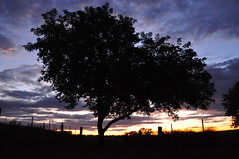 |
| Photo by Tim Nafziger |
Ched touches on similar themes in his recent blog post titled with a similar quote, "We Won’t Save Places We Don’t Love." He compares the way suburbanites relate to their place to the way farmers and indigenous communities relate to the land they live and on which they work.
Chris has been working with Christian Peacemaker Team's local partners in Colombia since August 2008 when he graduated from the first training that I helped with after joining CPT. He pointed out that our local partners are not struggling for abstract concepts like justice or environmentalism. They are fighting for places that they know intimately.
Chris says:
For example, CPT Colombia is accompanying The Southern Bolivar Agricultural-Mining Federation (AGROMISBOL), which is a network of primarily subsistence small-scale miners throughout the entire Sierra de San Lucas mountain range, a mountain range rich in natural resources such as gold and water. The livelihoods and life-styles of these miners and farmers is in jeopardy because of military and paramilitary efforts to clear the land in order to provide international corporate mining unfettered access to resources.
Of course these communities are concerned about issue-based politics, such as environmentalism, classism and the right to an education. But the fundamental core to their resistance is about remaining on the land they know and love. Recently, one member of these communities, spoke to exactly this by telling me, "Look at this paradise that has been given to us. We won't give up easily and leave this land. Look at the resistance here – they threaten us, cut us, assassinate us, but we continue to stay because the riches of this country are for the Colombian people. God has given us this.”
This holds true beyond the Colombia team. In Iraq, much of the team's work has been with families displaced from their homes in the mountainous border region between Iraq and Turkey and Iraq and Iran. The impact of the bombings is tied directly to its impact on their land. One recent release from the team begins with this quote from a village leader,"The tomatoes will be ready in a few days, Yesterday there was bombing on this mountain."
I've already written on this blog about the First Nations community in Ontario that stood up to logging companies who tried to strip their land bare. In Palestine, the community of At-Tuwani has for years nonviolently resisted violent attempts by Israeli settlers to displace them.
Often I find that when I write or talk about peace and justice work, people begin to throw around terms like "leftist ideology." My conversation with Chris helped me realize that the central desire for CPT partners flows not out of these abstractions but out of a knowledge of and love for a place. It's also the reason for the endurance and strength of these communities in the face of such immense odds.
We can see the images of bio-regionalism running through the Bible, especially in prophetic visions of peace and justice, such as in Micah 4:3-4:
3 God will judge between many peoples
and will settle disputes for strong nations far and wide.
They will beat their swords into plowshares
and their spears into pruning hooks.
Nation will not take up sword against nation,
nor will they train for war anymore.
4 Every one will sit under their own vine
and under their own fig tree,
and no one will make them afraid,
for God Almighty has spoken.
This image in verse four is not an abstract idea; it is concretely realized in the plants and fruits of Isaiah's bio-region: the fig tree and the grape vine. God's vision of shalom is for the whole world, but it is realized in the particulars of our place and our home.
For those of us who have grown up in the suburbs or cities of North America, there is a clear challenge to participate in what Ched calls "re-place-ment". In our work as Christian Peacemaker Teams, our partners invite us into this practice through the witness of their lives and their love for the land God has given them.
_________________________________________________________________________________
Tim Nafziger is a activist, writer, organizer and web developer. He lives in the Rogers Park neighborhood of Chicago with his wife Charletta where he attends Living Water Community Church. He is the administrator for the Young Anabaptist Radicals blog and serves as Outreach Coordinator for Christian Peacemaker Teams. For more about his life, read his first blog post.

No comments:
Post a Comment